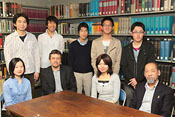Masayoshi Tarui, Professor, Faculty of Letters
Wolfgang Ertl, Associate Professor, Faculty of Letters
Good, Right - What does that mean?
We discuss fundamental issues of Ethics and Social Philosophy both in Japanese and English. In our seminars, we have two fourth-year students, three third-year students, and three graduate students.

If you wish to express the subject of ethics in a couple of words, it is “the good”. To think about the meaning of “good”, what is good, and why it is good, are the questions of ethics. Every human being has the ability and right to judge whether human conduct, human nature, human relationships, the mechanism of society – and above all, the way people live – are good or not good. However, not everyone is aware of the criteria of judgment. The task of ethics is to make them clear.
Regardless of time or place, what is good in human relationships is to treat others with respect. However, speaking about treating others with respect in terms of what is right, freedom, equality or justice began in the modern age in Western Europe; that is to say, it started in a small part of the world only three or four hundred years ago. Nowadays, however, these words are widely accepted as “The Universal Declaration of Human Rights” shows. In our society, we daily use these words which were translated into Japanese more than one hundred years ago.
Regarding freedom and equality, arguments have been developed from several perspectives such as John Rawls’s Liberalism, Robert Nozick’s Libertarianism, and Alasdair MacIntyre’s Communitarianism. Also, scholars influenced by Kantian Deontology, the Utilitarianism of Jeremy Bentham and John Stuart Mill, and by the Virtue Ethics of Aristotle and Thomas Aquinas continue examining what is meant by a good deed and what a good person is. In this seminar, we read papers and articles written in English that outline those main themes of modern ethics, and discuss them both in Japanese and English. We proceed from two perspectives, namely 1) considering abstract ethical principles and concrete ethical issues in their mutual dependency, and 2) examining the local cultural and economic reality in its relation to the global context.
Faculty Profile
Prof. Masayoshi Tarui, Faculty of Letters
- Completed Doctor’s programme at Graduate School of Letters, Keio University in 1976.
- Became a research associate at Faculty of Letters in 1976, and has been professor since 1996.
- Academic field of special interest: social philosophy and bioethics.
Faculty Profile
Associate Prof. Wolfgang Ertl, Faculty of Letters
- Obtained a Ph.D. in philosophy from Friedrich-Alexander-Universität Erlangen-Nürnberg in 1996 and became an assistant professor at the Philosophy Department of that university.
- Gained a “Habilitation” (i.e. a post-doctoral degree comparable to a second Ph.D.) in 2004, and has been associate professor of Keio University since 2005.
- Specializes in the history of ethics and philosophy from Aquinas to Kant, and in modern ethics and metaphysics.
Student's Voice
Daisuke Shigenaga, Fourth-year Student, Faculty of Letters
Building the foundations of a “True Cosmopolitan”
The 21st century is an era of confusion. The term is overused, but I think it is true. Politics, economics, academics, culture – in every realm of modern society principles that our ancestors have established in the past hundreds of years – are falling apart. A variety of principles that ‘modern times’ have given birth to, such as personal freedom and equality, the market and autonomy of civil society, and democracy, need to be reviewed fundamentally.
In our seminar we critically re-examine the principles of Western modernization by reading representative books under the guidance of Prof. Tarui and Associate Prof. Wolfgang Ertl. We mainly use English in the seminar, which is a very small class consisting of two teachers and five students. The students are required to actively express their opinions under the motto of “half-learning and half-teaching.”
It is not an easy thing to do, but I believe that pondering on the West in English in the small group study style is to develop the most fundamental qualities of a “true cosmopolitan” because “a true cosmopolitan” is a truly educated person.
*Position titles, etc., are those at the time of publishing.
